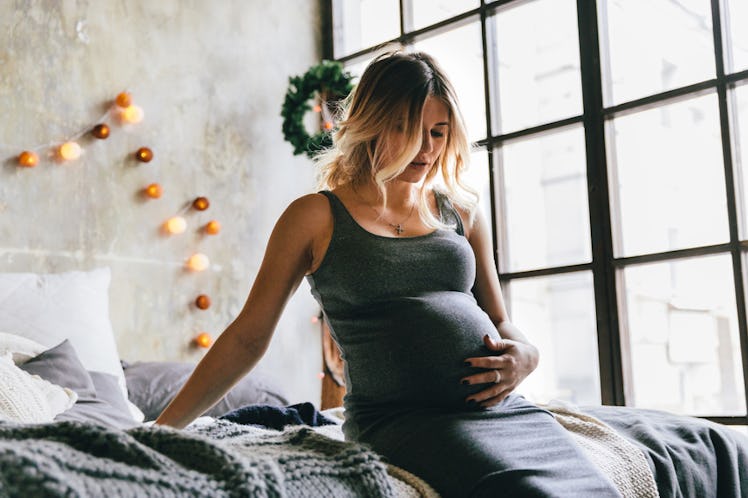
Yes, You Really Can Get Pregnant While You're Already Pregnant & Here's What That Actually Means
The female body never ceases to amaze me with its myriad of miracles. Our anatomy allows us to give the gift of life again, and again, and sometimes, at the same damn time. Obviously women have given birth to twins, triplets, quadruplets, and so forth, but can you get pregnant while pregnant? Two pregnancies for the price of one is definitely a thing, ladies, so if you thought your eggo couldn’t get preggo with a bun already in the oven, think again.
California native and gestational surrogate Jessica Allen told the New York Post that when she gave birth to twins, it turned out that one of the two baby boys turned out to be her own biological child. Allen said that despite using condoms, she and her now husband had gotten pregnant naturally after the in vitro fertilization.
Getting pregnant when you're already pregnant — otherwise known as superfetation — is an extremely rare medical incident (miracle?) that happens when an additional egg is released and fertilized during pregnancy. In short: It’s a double pregnancy. But what’s really interesting about this entire concept is that it’s a pretty well-known fact that when a woman is pregnant, ovulation — the releasing of eggs from a woman’s ovaries — comes to a temporary halt. Shook? Same.
So how in the world is getting pregnant while pregnant even anatomically possible?
It’s not a bunch of hocus pocus (though I totally would have believed otherwise). You can get pregnant while pregnant, and there’s actually a scientific explanation to clear up the confusion.
It’s true that ovulation stops when a woman becomes pregnant — usually. A woman’s body goes through a lengthy process to shut down any chance of a double pregnancy by releasing hormones to put ovulation on pause. Something called a “mucus plug” develops in the cervix to shield eggs from sperm, and the uterus lining changes so embryos cannot be implanted during this time.
Obviously, if a woman becomes pregnant while pregnant, her lady parts had to have dropped an egg while getting it on with a partner, and what do you know, another baby is suddenly cooking in the womb. It just means that the process by which ovulation would normally shut down simply did not occur for some reason. Dr. Saima Aftab, medical director of the Fetal Care Center at Nicklaus Children's Hospital, told Live Science this is such a rare circumstance, that there have been fewer than a dozen cases of superfetation documented in all of medical literature.
What does this mean for the babies once they're eventually born?
From what I understand, superfetation generally doesn’t happen in humans. It’s more of a general mammal thing, like cats and rabbits, for example. So when cases of superfetation were first seen in women, doctors were pretty much stumped. Even though it's far, far from the norm, however, birth risks are pretty minimal.
According to a New York Times Q&A published in Feb. 2017, when superfetation occurs, each fetus has its own amniotic sac. So while it’s definitely crowded in there, at least each baby has a sliver of personal space.
Additionally, because superfetation takes place after a woman is pregnant initially, therefore each child was conceived at different times, they are not fraternal twins, and their development does not sync up. Rather, they progress as they would during a normal pregnancy. However, premature births are likely to occur, as it is usually medically necessary to induce labor or have a C-section in these cases.
But because these types of situation are so rare, doctors are hesitant to diagnose them as superfetation.
Medical professionals are super cautious when it comes to diagnosing their patients, and rightfully so. Personally, I can especially understand their hesitancy when it comes to concluding a woman's children are products of superfetation, because it's so rare in humans, and because there's just not enough information available on the subject to definitively say one way or another.
In 2009, a woman in Arkansas claimed that she became pregnant again during her initial pregnancy, having conceived her children two and a half weeks apart. There was speculation whether or not her case was a rare example of superfetation, but experts were skeptical.
Jeffrey Kuller, MD, professor of obstetrics and gynecology at Duke University Medical Center, told WebMD,
We occasionally see a patient like this, where you'll see a discrepancy between the twin weights and growth, and oftentimes, the more likely explanation is just that one is lagging in growth or one has a problem, like a chromosomal abnormality, that makes it smaller than the other one.
Kuller, who claims to have dealt with a patient who had a suspected case of superfetation in the past, believes that rather than the woman having gotten pregnant later in her initial pregnancy, it's more likely that the second baby just wasn't discovered early on.
According to Scientific American, cases of women becoming pregnant when they're already pregnant are either accidental, or are associated with fertility treatments. So while it's definitely not considered normal to get pregnant while pregnant, it's absolutely possible. All I can say is, pregnant or not, use protection, ladies.